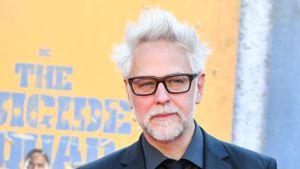The highly anticipated sequel to Ridley Scott's iconic Gladiator, aptly titled Gladiator II, has erupted onto the cinematic scene, drawing both excitement and controversy. After more than two decades since the original film captivated audiences and garnered numerous accolades, including five Academy Awards, the new installment aims to reignite passion for the epic tale, but not without facing considerable pushback. Central to the discussions surrounding this film has been the treatment of its cast, particularly the Egyptian-Palestinian actress May Calamawy, whose role has been significantly diminished.
Calamawy, known for her compelling portrayal of Layla El-Faouly, also embraced the mantle of Scarlet Scarab for Moon Knight, was initially praised as one of the noteworthy additions to the Gladiator II cast roster when she was announced. The excitement surrounding her inclusion quickly morphed to outrage as audiences realized her character's significant scenes had been cut. Reports indicated her involvement was more than just supporting; she was poised to be central to the narrative. So, what happened? The film has left many scratching their heads as her presence is almost non-existent, leading to cries of 'erasure' from loyal fans.
Social media platforms have exploded with fervor over the situation. Followers of the actress have taken to X (formerly Twitter) to express their frustration, criticizing both Ridley Scott and the film’s public relations team for their apparent oversight. Fans were especially incensed after Gladiator II's promotional activities rolled out, ignoring Calamawy's contributions entirely, and many felt her omission symbolized more considerable cultural silencing at a time when Palestinian voices are under intense scrutiny.
Pedro Pascal, Calamawy's co-star, stood out by posting selfies from the film's set on Instagram, which inadvertently highlighted the controversy. One social media user stated, "I'm glad he posted this because every other actor has been pretending like there wasn’t another cast member who had significant involvement but got cut from the movie." Such sentiments echo the frustration of many who see her sidelined role as more than just a creative decision, but as emblematic of broader systemic issues.
Some took the time to spotlight the ‘deafening silence’ from other Gladiator II cast members. Comments flowed with mockery at those who seemingly ignored or evaded acknowledgment of Calamawy: "The silence was deafening!" remarked one netizen, reflecting the sentiments of fans harboring disappointment at the lack of solidarity. Yet, there emerged supporters for both sides of the discourse. While several reassured concerned fans this was simply how the editing process often unfolded, others pointed out it was not unprecedented for actors to face cuts regardless of their skill.
But more troubling discussions emerged about potential political motives behind the decision to downplay Calamawy’s role. Given her vocal support for Palestinian rights, many speculate if her character's editing might be tied to the current cultural and political atmosphere. User discussions rippled through social media about the perceived connections, citing her background as an Egyptian-Palestinian artist. Some fans felt so strongly about the treatment of her character, they declared intentions to boycott the movie altogether. "Not because I know her personally or because she's Palestinian — it’s just wrong," voiced another supporter, adding fuel to the campaign against perceived biases within Hollywood.
Adding to the mix of opinions, some have argued for Scott's creative rights, framing the cuts as part of standard filmmaking practices. Nevertheless, there’s palpable disappointment many fans were expecting Calamawy's role to significantly impact the narrative — especially since she had appeared to encapsulate the essence of the film's themes.
With so much resting on Calamawy's exclusion and the film's ability to still resonate with audiences, the main question looming over Gladiator II is whether it can still manage to capture what made its predecessor iconic — the deeply woven storylines, the dramatic tension, and of course, riveting character arcs.
The concerns about Calamawy aren't the only thing shaping public perception of the new film. Critically, early evaluations have begun to emerge contrasting with enthusiastic public anticipation. A panel discussion released recently by CBC highlighted the debate between movie critics Hoai-Tran Bui, Rad Simonpillai, and Jackson Weaver, all of whom mulled over whether Gladiator II would endure as successfully as the original. Some industry insiders pondered whether Wicked, another highly expected release, would overshadow Gladiator II, potentially heralding another advertising phenomenon akin to Barbenheimer, which juxtaposed Barbie and Oppenheimer during the previous summer.
One of the most interesting dynamics to note about Gladiator II's release is its juxtaposition alongside flashy musical adaptions like Wicked. Audiences attending theaters were greeted with two visual spectacles, yet their journeys may lead to disagreement over which direction the two films should take. For its part, Wicked, starring Cynthia Erivo and Ariana Grande, portrays high-energy musical numbers, bringing vibrant colors and enchanting storytelling to life. Critics are attentive to where both films perform at the box office, trying to map out who the real winner of this cinematic clash will be.
Runtime-wise, Gladiator II overwhelmingly expands on the original, which was itself known for its epic scale, aiming to up the ante with grand visuals and high stakes, bringing new characters and dynamics. Paul Mescal leads as Lucius, alongside notable stars like Denzel Washington, Pedro Pascal, and Joseph Quinn, yet the film must grapple with this fresh lineup against the ever-present legacy of its 2000 predecessor.
SCOTT remarked on integrating fledgling actors, noting discovering Mescal during late-night bingeing on Normal People inspired his casting choice. He shared, “I need bedtime stories. Before I go to bed, I always watch something. I caught ‘Normal People’ almost by accident. It was not my kind of thing really, but I watched two and thought both the guy and the girl were terrific.” These remarks underline the director’s focus on nurturing new talent, even as this approach invites new scrutiny and challenges to uphold the standard set by the original film.
With tensions boiling over discussions of erasure, creative choices, and the theatrical race heating up between Wicked and Gladiator II, filmgoers eagerly set out to theaters. Questions hover: Can Gladiator II deliver the emotional heft audiences expect, and will it address the backlash surrounding Calamawy's sidelined role? All the industry can do now is await the reactions as viewers settle down for another cinematic saga, one way or another. The combination of storytelling, visual spectacle, and controversy is just the sort of brew excitement and disappointment alike can transform theatrical experience as one shaped by decades of memorable narratives. Could this sequel recapture the enchantment of its predecessor, managing to pay homage to the past, all the trouble still burning brightly?



